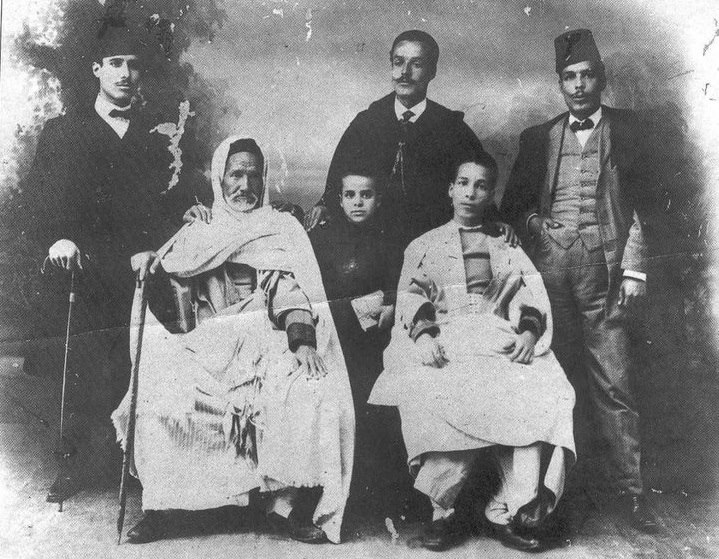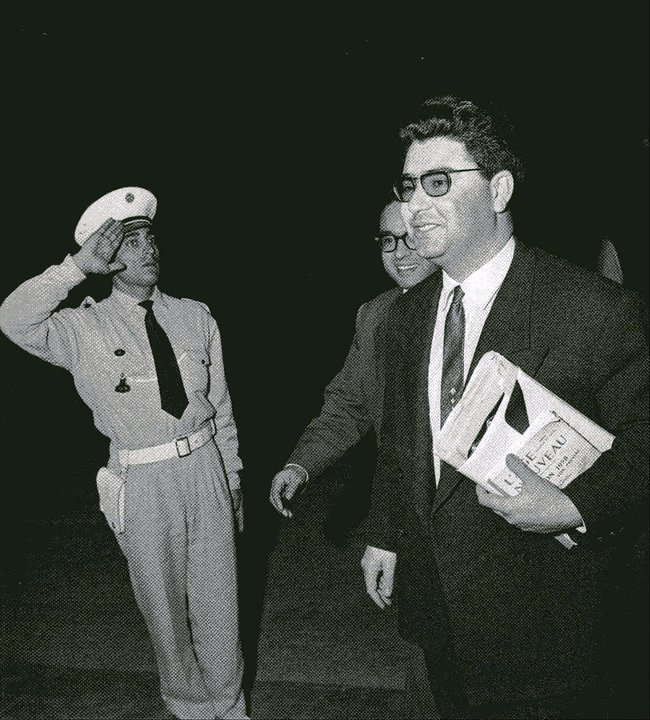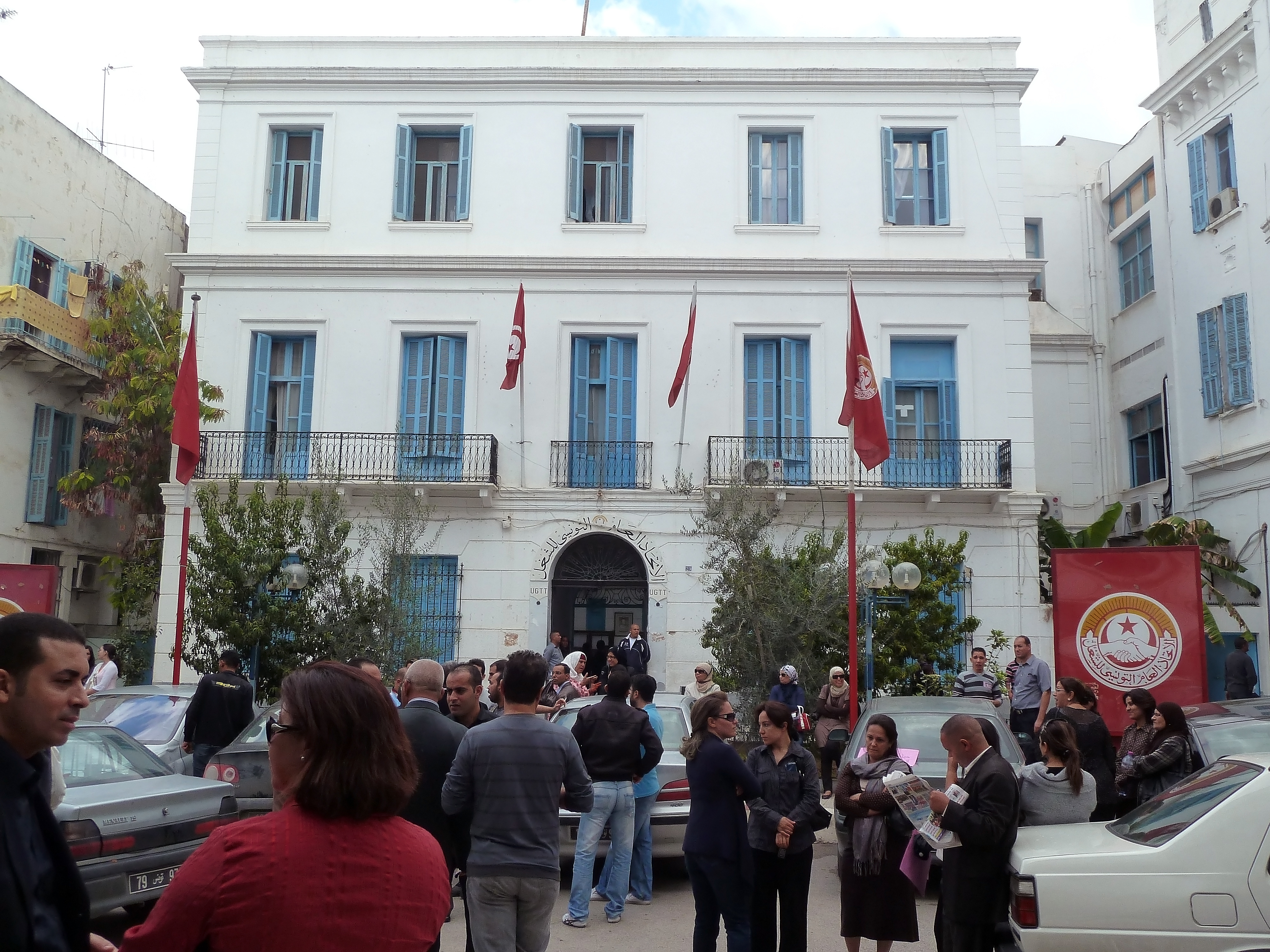|
Popular Unity Movement
Popular Unity Movement (Mouvement d'Unité Populaire, MUP), is a socialist political party in Tunisia. The MUP was formed by Ahmed Ben Salah in Swiss exile in 1973. Ben Salah was a trade unionist (Tunisian General Labour Union, UGTT) who had been a member of the ruling Socialist Destourian Party (PSD) and minister of economic planning in the government of Habib Bourguiba. In this role he pursued a communitarian socialist policy, aiming for a more unified and enlightened society by the means of a strong government. Ben Salah was made responsible for the economic failure of the late 1960s, dropped from the government, expelled from the PSD and sentenced to 10 years of forced labour in 1970. He escaped from prison in 1973 and fled abroad. His new party gathered intellectuals and Tunisian expatriates living in Europe. In 1977, it published a ''Charter of Democratic and Popular Liberties'' which had great influence on the political debate in Tunisia. However, the party remained illegal. ... [...More Info...] [...Related Items...] OR: [Wikipedia] [Google] [Baidu] |
Mohammed Mzali
Mohammed Mzali ( ar, محمد مزالي, 23 December 1925 – 23 June 2010) was a Tunisian politician who served as Prime Minister between 1980 and 1986. Early life Mzali was born in Monastir, Tunisia on 23 December 1925. His family has ancestry from the Ait Mzal tribe, a Berber tribe from the Sous region of Morocco. Their Ait Mzal ancestor settled in Tunisia after coming back from the '' Hajj'' in the late 17th century. Mzali studied at Sadiki College in Tunis and at the Faculty of Humanities at Sorbonne University in Paris. He was vice president of the Federation of Destourian Students in France from 1949–1950 and participated in literary social circles. He co-founded the literary magazine ''Al-Fikr'' in 2955 with Béchir Ben Slama. Political career Early career Mzali was a member of the Socialist Destourian Party. He held a series of government posts starting in the late 1950s that would eventually culminate in his becoming prime minister in the early 1980s. ... [...More Info...] [...Related Items...] OR: [Wikipedia] [Google] [Baidu] |
1973 Establishments In Tunisia
Events January * January 1 - The United Kingdom, the Republic of Ireland and Denmark 1973 enlargement of the European Communities, enter the European Economic Community, which later becomes the European Union. * January 15 – Vietnam War: Citing progress in peace negotiations, U.S. President Richard Nixon announces the suspension of offensive action in North Vietnam. * January 17 – Ferdinand Marcos becomes President for Life of the Philippines. * January 20 – Richard Nixon is Second inauguration of Richard Nixon, sworn in for a second term as President of the United States. Nixon is the only person to have been sworn in twice as President (First inauguration of Richard Nixon, 1969, Second inauguration of Richard Nixon, 1973) and Vice President of the United States (First inauguration of Dwight D. Eisenhower, 1953, Second inauguration of Dwight D. Eisenhower, 1957). * January 22 ** George Foreman defeats Joe Frazier to win the heavyweight world boxing championship. ** A ... [...More Info...] [...Related Items...] OR: [Wikipedia] [Google] [Baidu] |
Tunisian Constituent Assembly Election, 2011
An election for a constituent assembly in Tunisia was announced on 3 March 2011 and held on 23 October 2011, following the Tunisian revolution. The Assembly had 217 members. It was the first free election held in Tunisia since the country's independence in 1956, as well as the first election in the Arab world held after the start of the Arab Spring. The result was announced after counting began on 25 October 2011, and Ennahda won a plurality of votes. Background Senior party members of the disbanded former ruling party, the Constitutional Democratic Rally(RCD), were banned from standing in the election if they had been active in politics within the last ten years. Originally, the ban would have applied to all former senior party members (spanning 23 years instead of 10), but this was revised after protests by former RCD members. The election campaign officially started on 1 October 2011. Electoral system The voting system allocated seats through proportional representation ... [...More Info...] [...Related Items...] OR: [Wikipedia] [Google] [Baidu] |
Tunisian Revolution
The Tunisian Revolution, also called the Jasmine Revolution, was an intensive 28-day campaign of civil resistance. It included a series of street demonstrations which took place in Tunisia, and led to the ousting of longtime president Zine El Abidine Ben Ali in January 2011. It eventually led to a thorough democratisation of the country and to free and democratic elections. The demonstrations were caused by high unemployment, food inflation, corruption, a lack of political freedoms (such as freedom of speech) and poor living conditions. The protests constituted the most dramatic wave of social and political unrest in Tunisia in three decades and resulted in scores of deaths and injuries, most of which were the result of action by police and security forces. The protests were sparked by the self-immolation of Mohamed Bouazizi on 17 December 2010. They led to the ousting of Ben Ali on 14 January 2011, when he officially resigned after fleeing to Saudi Arabia, endin ... [...More Info...] [...Related Items...] OR: [Wikipedia] [Google] [Baidu] |
Popular Unity Party (Tunisia)
The Popular Unity Party ( ar, حزب الوحدة الشعبية; french: link=no, Parti de l'Unité Populaire, PUP) is an Arab nationalist party in Tunisia. History and profile The party was founded in 1981 as a breakaway from the left-wing Popular Unity Movement (MUP) by members who disagreed with MUP leader Ahmed Ben Salah's policy to boycott elections. In 1983, the government of Mohammed Mzali legalised two moderate oppositional parties, including the PUP. The party won two seats in the general election held on 20 March 1994. Following the elections of 1999, the PUP had 7 members in the Tunisian parliament. At the 2004 legislative elections, the party won 3.6% of the popular vote and 11 out of 189 seats. The same day, its candidate , won 3.8% at the presidential elections. In 2006, the PUP tried to form an alliance with three other minor oppositional parties, the Social Liberal Party (PSL), the Unionist Democratic Union (UDU) and the Green Party for Progress (PVP). However ... [...More Info...] [...Related Items...] OR: [Wikipedia] [Google] [Baidu] |
Habib Bourguiba
Habib Bourguiba (; ar, الحبيب بورقيبة, al-Ḥabīb Būrqībah; 3 August 19036 April 2000) was a Tunisian lawyer, nationalist leader and statesman who led the country from 1956 to 1957 as the prime minister of the Kingdom of Tunisia (1956–57) then as the first president of Tunisia (1957–87). Prior to his presidency, he led the nation to independence from France, ending the 75-year-old protectorate and earning the title of "Supreme Combatant". Born in Monastir to a poor family, he attended Sadiki College then Lycée Carnot in Tunis, before obtaining his baccalaureate in 1924. He graduated from the University of Paris and the Paris Institute of Political Studies (Sciences Po) in 1927 and returned to Tunis to practice law. In the early 1930s, he became involved in anti-colonial and Tunisian national politics, joining the Destour party and co-founding the Neo Destour in 1934. He rose as a key figure of the independence movement and was repeatedly arr ... [...More Info...] [...Related Items...] OR: [Wikipedia] [Google] [Baidu] |
Ahmed Ben Salah
Ahmed Ben Salah ( ar, أحمد بن صالح) (13 January 1926 – 16 September 2020) was a Tunisian politician and trade union leader. His power and influence peaked between 1957 and 1969 when he was able to implement his ideas for a planned economy, holding simultaneously several key ministerial posts. Life Early years Ahmed Ben Salah was born at Moknine, a mid-sized town in the coastal Sahel region, located between Monastir to the north and Mahdia to the south, in a region that during the run-up to decolonisation came to be known for nationalism. He undertook his secondary education at the prestigious Sadiki College in Tunis, completing his schooling in France during the 1940s. His schooling finished, he entered the world of liberation politics, becoming president of the youth wing of the Destourian party (''jeunesse scolaire destourienne'') and in 1947, while still in France, working to ensure liaison between the Neo Destour nationalist movement in Tunisia, their ex ... [...More Info...] [...Related Items...] OR: [Wikipedia] [Google] [Baidu] |
Socialist Destourian Party
The Socialist Destourian Party ( ar, الحزب الاشتراكي الدستوري ' ; french: Parti socialiste destourien) was the ruling political party of Tunisia from 1964 to 1988. Bahi Ladgham was the first Prime Minister from the party and Hédi Baccouche was the last. It was founded on 22 October 1964 and disbanded on 27 February 1988. Habib Bourgiba was the first president of the Socialist Destourian Party from 1964 to 1987. He was succeeded by Zine El Abidine Ben Ali from 1987 to 1988. History Independence of Tunisia from France was negotiated largely by the Neo Destour's Bourguiba. The effective date was March 20, 1956. The next year the Republic of Tunisia was constituted, which replaced the Beylical form of government. Tunisia became a one-party state, with Neo Destour as the ruling party under Prime Minister and later President Habib Bourguiba. Later the Neo Destour party was renamed the Socialist Destourian Party in 1964, to signal the government's commitment t ... [...More Info...] [...Related Items...] OR: [Wikipedia] [Google] [Baidu] |
Tunisian General Labour Union
The Tunisian General Labour Union (french: Union Générale Tunisienne du Travail, ''UGTT''. ar, الاتحاد العام التونسي للشغل) is a national trade union center in Tunisia. It has a membership of more than one million and was founded January 20, 1946. The UGTT is affiliated with the International Trade Union Confederation and the Arab Trade Union Confederation. The UGTT worked together with the Tunisian Human Rights League, the Tunisian Confederation of Industry, Trade and Handicrafts and the Tunisian Order of Lawyers – collectively labelled the National Dialogue Quartet – to address the national discord following the Jasmine Revolution of 2011. The National Dialogue Quartet was announced as the laureate of the 2015 Nobel Peace Prize "for its decisive contribution to the building of a pluralistic democracy in Tunisia". Chairman (secretaries-general) *1946–1952: Farhat Hached *1952–1952: Mahmoud Messadi *1952–1954: Mohamed Kraïem * ... [...More Info...] [...Related Items...] OR: [Wikipedia] [Google] [Baidu] |


.jpg)


